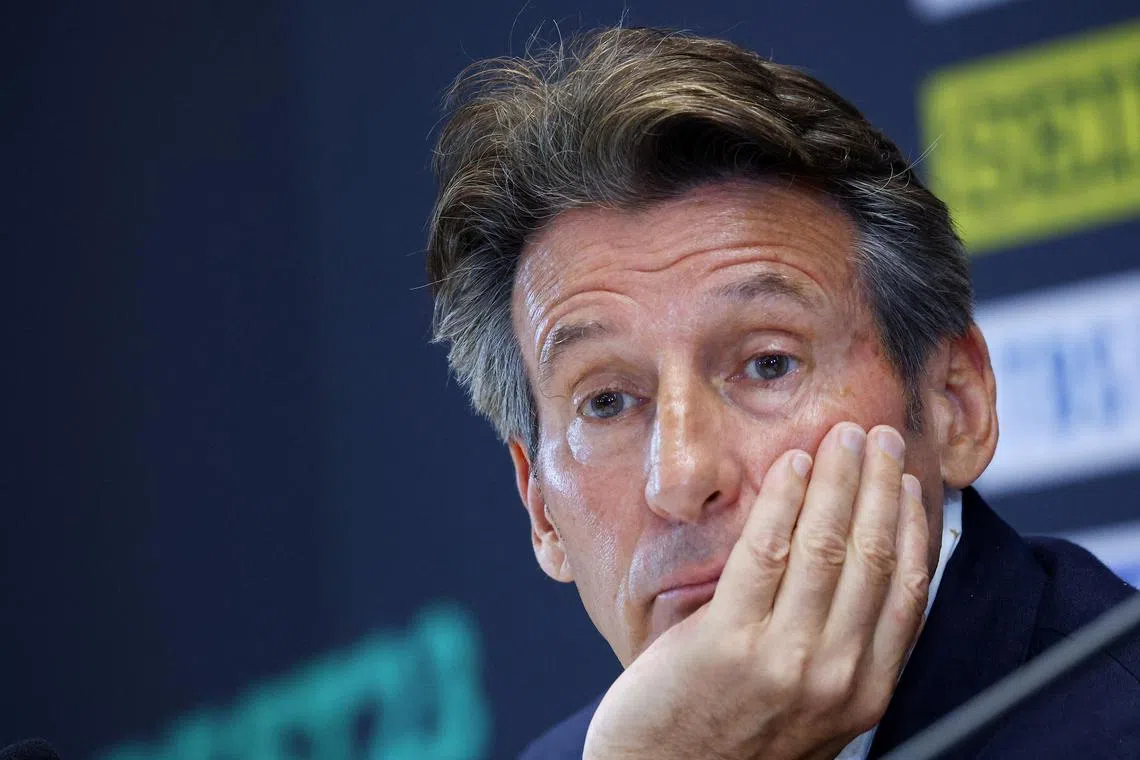World Athletics chief Sebastian Coe says sports must take responsibility for adapting to climate change
Sign up now: Get ST's newsletters delivered to your inbox

Sebastian Coe, president of World Athletics, during a press conference on Friday ahead of the World Championships in Budapest.
PHOTO: REUTERS
Follow topic:
BUDAPEST – Athletics faces an uncertain future in the face of the changing climate, with the sport’s head Sebastian Coe warning on Friday that athletes are already suffering and some member federations’ countries might not even exist in the future.
Nearly 80 per cent of athletes surveyed by World Athletics said they are seriously concerned about the climate crisis, and some 75 per cent said their competition or training has already been affected, the Briton said on the eve of the world championships.
In a summer that has seen wildfires raging, record high temperatures across southern Europe relentless flooding in Asia,
“Where would I start?“ the twice Olympic champion said.
“I genuinely don’t think governments are going to meet any of the targets that are being identified. And this is very much a personal view, I’m not speaking on behalf of World Athletics. It’s something that I have felt very strongly about for a long time.
“Constituent groups like sport are going to have to figure this out for themselves, because I don’t think we can rely on governments to remotely get to grips with what is going to be a massive shift in reality in the next few years.
“There are countries in our federation that will probably not be in existence in the next 20 years because of rising sea levels.”
The 2020 Tokyo Olympics marathon and race-walking events were moved 800km north to Sapporo to avoid a repeat of the 2019 world meet in Doha, where many athletes succumbed to the heat and dropped out of distance events.
Rising temperatures forced the 10,000m event to be rescheduled at the Olympic trials in Eugene,
“The temperature started out mid-30s. By the time I left those championships, it had got to 44 – and that’s the relatively equable climate of Oregon,” Coe said.
He added that scheduling competitions, particularly for endurance events, at times of the year when temperatures are more favourable is a consideration.
The mid-September slot for the 2025 world championships in Tokyo
“We have a challenge everywhere we look. The welfare of the athletes for me always needs to be primary,” Coe said. “It’s not beyond the wisdom of all of us to figure this out. But this is a challenge that isn’t going to go away.”
“Are there countries that we’re not going to be able to go to?” he added.
“Climate change is affecting everybody. Whether it’s forest fires, flooding, landslides, we’ve got problems here and it’s not limited to those areas that we were instinctively having to figure out 20 or 30 years ago. It’s on our doorstep.”
Meanwhile, Alvaro Martin of Spain captured gold in the 20km race walk in the opening event of the World Athletics Championships on Saturday.
The 29-year-old moved into the lead with about 5km left to win in 1hr 17min 32sec, the world’s fastest time this season, on the soggy loop course that started and finished at picturesque Heroes’ Square.
“I missed (Olympic) bronze which motivated me to work hard,” he said. “In Tokyo, I felt when I was in the fourth position that I could win a medal. Unfortunately, it did not happen...
“The next goal is the gold at the Olympic Games but the only thing I want to do now is to cry out of happiness.”
Sweden’s Perseus Karlstrom, a three-time world bronze medallist, won silver in 1:17.39, while Caio Bonfim of Brazil claimed the bronze (1:17.47) to match his medal from the 2017 worlds in London.
Martin, who was fourth at the Tokyo Olympics and seventh at the worlds in Eugene in 2022, shaved nearly two seconds off his best time. REUTERS

